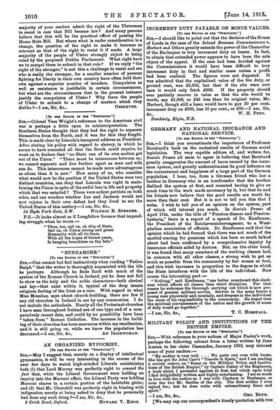GERMANY AND NATIONAL INSURANCE AND NATIONAL SERVICE. [To THE EDITOR
07 THE " SPECTATOR."]
SIR,—I think you overestimate the importance of Professor Bernhard's book on the undesired results of German social legislation. The very capable editors of, and writers for, Soziale Praxis all seem to agree in believing that Bernhard greatly exaggerates the amount of harm caused by the insur- ance system, and greatly underestimates its good influence on the contentment and happiness of a large part of the German population. I hear, too, from a German friend who has a. brother in Germany who is an ironfounder that the brother disliked the system at first, and resented having to give so much time to the work made necessary by it, but that he and his friends now believe that the good results are worth far more than their cost. But it is not to tell you this that I write. I wish to tell you of an opinion on the system, part of which will interest you much. In Soziale Praxis of April 17th, under the title of "Pension-disease and Pension- hysteria," there is a report of a speech of Dr. Kaufmann, the President of the Reichsversichernngsamt, to a West- phalian association of officials. Dr. Kaufmann said that the opinion which he had formed that there was not much of the morbid craving for pensions which has been so much talked about had been confirmed by a comprehensive inquiry by insurance officials aided by doctors. But, on the other• band, it was found that many members of the working classes had, in common with all other classes, a strong wish to get as much as possible from the community by fair means or foul, and this wish increases in proportion to the degree in which the State interferes with the life of the individual. Now comes the interesting part :—
" Nothing," said Kaufmann, " can better counteract this slack- ness which affects all classes than strict discipline. For that reason he welcomes the thorough carrying out which is now pro- posed of general military service. Service in the army braces a young man physically and mentally, and deepens in the individual the sense of his responsibility to the community. He hoped that the spiritual convalescence of the nation and the growth of sense of duty would go together."














































 Previous page
Previous page